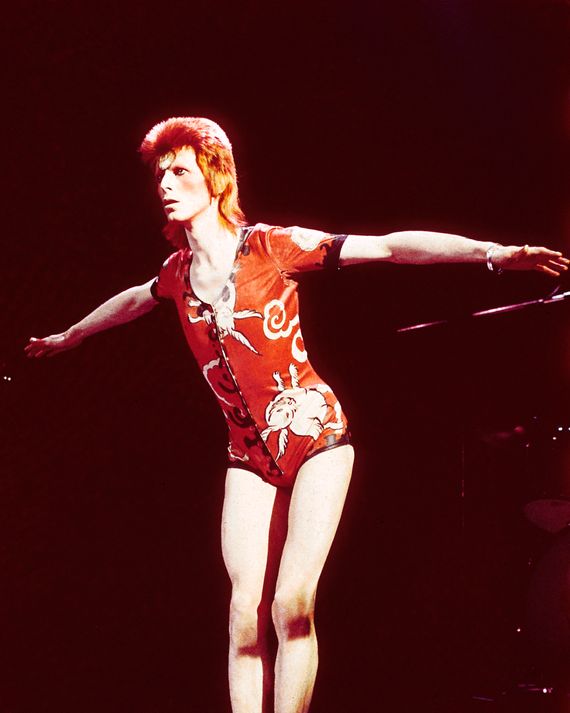
In 2017, nonfiction filmmaker Brett Morgen landed unprecedented access to a trove of material that would make any dedicated rockumentarian’s head explode: more than 5 million “assets” from David Bowie’s personal archives, including never-before-seen performance footage, long-lost interview clips, still photographs, journals, and recording outtakes, as well as the “Space Oddity” singer’s own drawings and paintings. Morgen, of course, is somewhat accustomed to getting inside beloved rock stars’ locked vaults, having previously directed the Sundance Film Festival–anointed Kurt Cobain: Montage of Heck (which was similarly sanctioned by the Nirvana front man’s estate) and 2012’s Crossfire Hurricane, the rock documentary chronicling the Rolling Stones’ early years ahead of their 50th anniversary as a group. But two unexpected developments ended up turning Morgen’s Bowie doc Moonage Daydream — a kaleidoscopic, two-hour-and-14-minute filmic tour de force that arrives in theaters and on IMAX on September 16 — into anything but business as usual.
Shortly after going into production, the director suffered a massive heart attack and fell into a days-long coma. Then, deep into editing Moonage Daydream when the pandemic struck, Morgen was forced into total isolation, with Bowie’s philosophical musings on art, alienation and the nature of existence compelling him to thoroughly reevaluate his own life.
Deliberately nonnarrative, shot through with arresting visuals, additional animation, and all the bombast of rock concert–esque sound design — and featuring not a single talking-head interview — Moonage Daydream arrives as something more than a “Behind the Music”–style fact-based film.
Over Zoom, Morgen — who met the Thin White Duke in 2007 when he pitched him on a wild-sounding hybrid performance–nonfiction film — discussed the five-year odyssey of compressing millions of assets into a documentary that is ultimately “about light” and how the Tao of Bowie ended up leading him toward a kind of “resurrection.”
Walk me through how you approached sorting through that enormous trove of material and how you went about organizing it into what we see on screen.
Brett Morgen: The Bowie estate provided me with its entire archive. It took an enormous amount of time to ingest that. The assistant editors collated it chronologically, which I always do when I’m screening material; I’m trying to look for a through-line, for themes, to see what material will be accessible in a large-screen theatrical environment. And that through-line had been stated by David on several occasions throughout his life: “Chaos and fragmentation are my through-line.”
My films, up until this point, have been very rigidly cause-and-effect narratives. I didn’t anticipate during that two years how daunting writing a nonbiographical narrative would be. I started to break that theme down into smaller units. I said, Okay, there’s a relationship to spirituality, gender fluidity, physical transit, being “Lodger,” being on the road. What happens when you don’t move? The ’80s. But that’s not a story. Then I spent eight months trying to figure out how to script the film.
Did you feel obligated to include certain things? Like, I have to put in Ziggy Stardust but I’m going to leave out Aladdin Sane?
BM: I rejected that from the very beginning: the idea of characters. By the time I had screened all the footage, I was sort of like, These aren’t even characters per se. They’re different states of his drug use. I thought his locations — Los Angeles, Berlin, the Far East — were far more interesting. But there was eight months of trying to write these ideas into a narrative.
Ultimately, I kept thinking, Is there a way to employ Joseph Campbell’s hero’s journey with David? And I was like, Okay, if I take The Iliad and just make it so David’s creating his own challenges, and Brian Eno is Yoda, now I have this journey to explore all these ideas I want to explore.
There is an extraordinary piece of audio in the film in which Bowie calls himself a “false prophet.” He’s exposing himself in a way I had never heard before, and it doesn’t necessarily portray him in the most positive light. It made me wonder if the estate put any restrictions on what you could include.
BM: When I heard that interview with Mick Rock, I was like, Aha! This is the blueprint! — in terms of understanding Bowie and what Bowie was consciously putting into the world. There’s a part of that interview I don’t use where Mick says, “So David, I hear you have this album coming out called Ziggy Stardust, some sort of space-age opera or something.” And David goes, “Ah, no, man. I just mentioned a space guy in two songs. There’s nothing there. The audience is going to project and fill in the blanks.” That was the key for me to understanding Ziggy and Bowie: projection and fill in the blanks.
He’s not really providing us with information in his music. But he’s so smart in how he writes that we are able to grab meaning in these songs that were sort of random syllables and consonants. I throw 52 cards on the ground and it’s a fucking mess. Bowie does it and you’re like, “Whoa! Do it again!”
But did the estate put limits on you?
BM: David’s executor, Bill Zysblat, said to me, “David’s not here to authorize or approve the work. So this can never be David Bowie on David Bowie. It needs to be Brett Morgen on David Bowie.” That was quite liberating. I had the same experience on Montage of Heck, where the executor [of Kurt Cobain’s estate] gave me final cut. I called him and said, “I’m ready to show you the film.” He goes, “Am I going to like it?” And I was like, “Well, I don’t think you’re going to be selling too many T-shirts.”
With this film, I don’t think there’s any way I could have blown up the Bowie brand. It’s so big. But they were putting it at risk. The film could have gone in any direction. It could have been all Tin Machine. It could have been Bowie in the ’80s. It was anything I wanted it to be as long as it was my own expression. They were risking something but at the same time empowering me to create a piece of art. If nothing else, it was not going to be a corporate product.
There’s a sequence in the film in which we are shown how itinerant Bowie was during the 1980s: how he moved from country to country absorbing influences but didn’t own a home or ever settle in one place. You show him moving through Asian cities, hanging out with locals and riding these neon-lit escalators. It’s so cinematic. Where did that footage come from?
BM: It was the tail end of his Serious Moonlight Tour. They’d been on the road for eight months. And David didn’t really have anywhere to return to; I don’t think he had a home. And so he said, “Let’s do another run through Southeast Asia. And I’d like to make a film, sort of traveling through there. We’ll use the proceeds from the concert to finance the film.” They hired a travelogue photographer to shoot it. It was just David walking around Singapore, Bangkok, and Hong Kong. Within the Bowie world, the inner circles, it was … I don’t want to say laughed at. But put it this way: The film disappeared relatively fast. It came out on VHS in 1984.
When I saw it, I thought it was the Holy Grail. To me, it was more important than the Hammersmith show because this was the only time I’ve ever seen the visual metaphor that I needed to present David as an explorer, a stranger in a strange land, both godlike and mysterious. Fucking everything!
You suffered a heart attack right around the time you started working on this film. To what extent did the stress of taking on a project of this scope contribute to your health issues?
BM: I absolutely will talk about it as long as you promise that’s not going to be the headline of this piece. I get so cringey with clickbait like, “Director Has Heart Attack Making Film.”
You have my assurances!
BM: It was integral to the construction of this film. I’m not so method that I provided myself a heart attack so I could get myself into that state. But on January 5, 2017, I was leaving work and went to moderate a screening at the Silent Movie Theater and had a heart attack in a room with 140 people. Fortunately, I was three minutes from Cedars Sinai. I flatlined in the ER. And then I was in a coma for a week.
When I woke up, I was not reformed. The first words out of my mouth to my surgeon were, “I need to be on set Monday.” He goes, “You’re not going anywhere.” I was insane. It happened because I was a workaholic my whole life. Stress. I stress out over everything. Very sensitive to criticism and bad lifestyle habits; it all led to a heart attack at 47.
So coming out of that, I started going through the Bowie materials. I had never listened to interviews with him before. I had no idea how sage he was, how committed he was to his life philosophy — and how much I needed that at that moment in my life. I’m listening to this and reflecting on my own life realizing that, through David, I would have a road map to leave behind for my children to lead a more balanced and fulfilled life in an age of chaos and fragmentation.
The film was like a resurrection. It was me learning how to live. If I had made this film when I first met David in 2007, it would not have been this life-affirming road map. That was so specific to my condition and the pandemic. I had written the film right before the pandemic and started editing right as we got into shutdown. Now I’m totally isolated. Because of my heart condition and no vaccine, I can’t be near another human being. And I’m sitting here with a guy who’s telling me how to be creative during periods of isolation and alienation. One problem: movie theaters are shut and I make film only to exist in movie theaters. But from a narrative standpoint, it felt all very like the perfect environment to construct the experience.
One of my questions was going to be how making Moonage Daydream was different from making Montage of Heck — but it sounds like they couldn’t have been more different.
BM: Montage of Heck is about pain. Bowie is about light. One is about someone for whom every day was a struggle. The other is about someone for whom every day was an opportunity for enrichment. Montage of Heck is a very linear biography with one trick, which is Kurt’s externalization of his interior life, in essence presented through his artwork. And Bowie, I was just totally by myself. It was finding my way through the darkness. It was really about closing your eyes and finding your way through.




